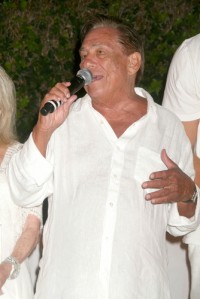NBA owner Donald Sterling suspended for life, and experts say his legal options are limited
Los Angeles Clippers owner Donald Sterling was banned for life from the National Basketball Association and fined $2.5 million after a recording surfaced over the weekend of him making racist and sexist statements.
In a press conference in New York City on Tuesday, NBA Commissioner Adam Silver announced that Sterling would not be allowed to have any further association with the Clippers or the NBA. Silver also stated that he would ask the NBA Board of Governors to force a sale of the Clippers. Sterling has owned the team since 1981, when it was based in San Diego. Sterling is the longest-tenured owner in the NBA.

L.A. Clippers owner Donald Sterling. s_bukley / Shutterstock.com
“As part of the lifetime ban, Mr. Sterling may not attend any NBA games or practices, be present at any Clippers office or facility, or participate in any business or player personnel decisions involving the team,” said Silver during the press conference. “He will also be barred from attending NBA Board of Governors meetings and participating in any other league activity.” Silver also said that the fine, which was maximum allowed, will be donated to anti-discrimination groups.
Sterling, meanwhile, isn’t going away quietly. According to Fox News, Sterling told Jim Gray moments before the press conference started that his team was not for sale. Sterling’s attorney, Robert Platt of Manatt, Phelps & Phillips, declined comment when ESPN contacted him.
Legal experts were not surprised by Silver’s actions. Gary Roberts, dean emeritus at Indiana University Robert H. McKinney School of Law and a prominent sports lawyer told the ABA Journal that Silver really had no choice. “For obvious reasons, Silver unsurprisingly handed out the most severe penalties he believes he could legally get away with,” Roberts said in an email. “It was a pure business decision to distance the league as far as it could from a team owner who had made it impossible for him to continue to own a viable NBA franchise.”
Marc Edelman, a professor of sports law at Baruch College’s Zicklin School of Business told the ABA Journal that he was impressed with Silver for bringing down the hammer on Sterling. “[Former NBA commissioner] David Stern and [NFL commissioner] Roger Goodell have shown a repeated pattern of holding athletes to the highest level of conduct but accepting that their owners sometimes behave far below that bar,” Edelman said. “This was an impressive move by Silver.”
The potential effects of Silver’s move are less clear. Dallas Mavericks owner Mark Cuban had called Sterling’s views “abhorrent,” but had also expressed doubt about the wisdom of forcing Sterling out permanently, the Dallas Morning News’ Dallas Mavericks Blog reported. Cuban argued Monday that the NBA faced a slippery slope if they forced out people for statements made in private (Cuban then sent out a Tweet on Tuesday saying he supported Silver’s decision). While Edelman agreed that Silver’s decision could set a precedent and could, conceivably, be used against another owner that steps out of line, Roberts was less convinced, calling the Sterling episode “sui generis.”
“This doesn’t set any precedent at all unless another owner someday expresses an equally stupid sentiment that renders him incapable of owning and operating a viable NBA franchise,” said Roberts.
Experts agree, however, that Sterling’s legal options are limited. “I’m not sure it’s the right decision to challenge the ban,” Edelman says. “But there are some contract and antitrust claims he could bring.” Edelman, who said he did not have a chance to review the NBA’s constitution, says that Sterling could try and argue that other teams lack power to order the sale of a team by a particular owner. However, according to the NBA’s constitution and bylaws (PDF), Article 13(a) explicitly gives the NBA the power to terminate an owner’s interest with a three-fourth’s majority vote of the owners. During the press conference, Silver said he had the full support of the owners and indicated that he expected to successfully force a sale of the team.
Edelman believes that Sterling’s best bet would be to bring antitrust claims against the NBA. “Sterling could argue the other owners have colluded against him by refusing to do business with him,” Edelman said. “Generally, it’s illegal for a collection of businesses to reach a concerted effort to refuse to deal with a competitor.” However, Edelman says the NBA could defeat an antitrust suit if it proved that its association with Sterling was hurting the league’s image, as well as damaging its monetary value.
Roberts, meanwhile, was more resolute and stated categorically that Sterling would lose if he challenged his ban in court. “His chances of winning in court are zero,” Roberts said. “To what end would it serve? So that he can continue to own and operate a business that will be bankrupt with no players willing to play for him? He may be a belligerent, but he is not insane.” His best bet, according to Roberts, might be to argue that under the NBA’s constitution he can’t be forced to sell his team. “Unless the NBA constitution has been recently amended, the other owners cannot take his franchise from him with a three-fourths vote unless he does one of a specified list of things related to the team or the league, and this clearly is not the type of thing that is on that list,” Roberts said. “When Silver said the owners would force him to sell, he had to mean they would make him so unwelcome and miserable that he would have no choice but to sell.”
Also see:
CNN Opinion: “What happened to Sterling was morally wrong” (Op-Ed by Marc J. Randazza)
Updated on April 30 to reflect that Sterling is still the owner of the Clippers.
Write a letter to the editor, share a story tip or update, or report an error.


